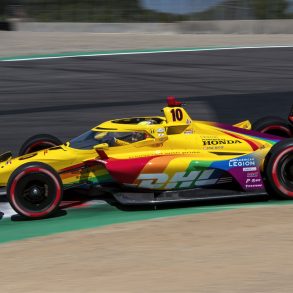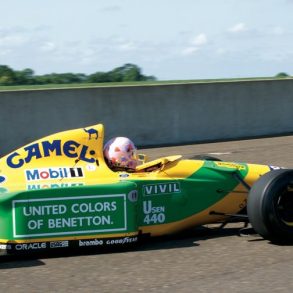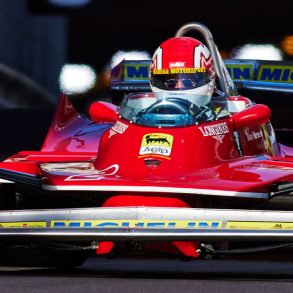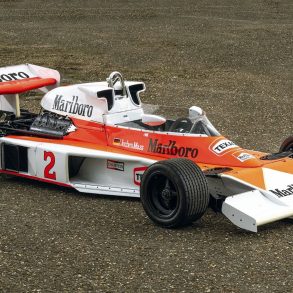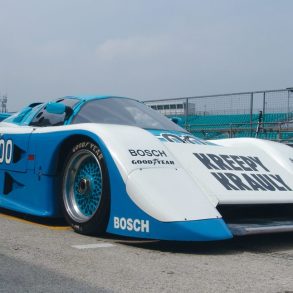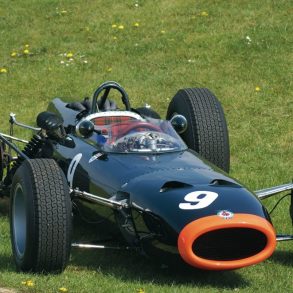Gilles Villeneuve Biography
“He’s different from the rest of us, on a separate level …” Jacques Laffite describing Gilles
Gilles Villeneuve was born in Quebec on 18 January, 1950. He rose up through snowmobile racing and Formula Atlantic. In fact he credits some of his success to his snowmobiling days:
“Every winter, you would reckon on three or four big spills – and I’m talking about being thrown on to the ice at 100 mph. Those things used to slide a lot, which taught me a great deal about control. And the visibility was terrible! Unless you were leading, you could see nothing, with all the snow blowing about. Good for the reactions – and it stopped me having any worries about racing in the rain.”
In 1976 he dominated the Formula Atlantic championship with an Ecurie Canada team so impoverished that he was forced into the role of spectator at the Mosport race because the team couldn’t afford to field an entry. This impressive performance against daunting odds earned him a great deal of notice and a spot with McLaren.

But in August of 1977 Maranello called. Enzo Ferrari said that when he first met the diminutive Canadian, he was immediately reminded of the great Nuvolari. Ferrari’s obvious interest in Villeneuve prompted Niki Lauda to jump ship at Canada in October, and Gilles began his short but storied Ferrari career in a less than auspicious fashion. In the Mosport race he left the course on someone else’s oil. The next race, at Fuji, saw him off again, but this time at the cost of some spectators’ lives. He would later remark that:
“If someone said to me that you can have three wishes, my first would have been to get into racing, my second to be in Formula 1, my third to drive for Ferrari…”
The first of Villeneuve’s six F1 wins came the next year, fittingly enough at Canada. All told he won six Grands Prix. In 1979 he finished second in the championship to teammate Jody Scheckter, the luster of whose reputation is today considerably duller than that of Gilles. The quality of the cars that Gilles had at his disposal was uneven, and much of his racing was against the last of the world-conquering Lotuses, the ground effects 79. But for these reasons he probably would have won several more races. It can be argued that his method was not as conserving of his machinery is it might have been, and that this contributed to his relatively low win total.
Gilles Villeneuve’s all-or-nothing approach was well known. An example: at Watkins Glen one year, qualifying on the first day on a soaked track, he left his competitors scratching their heads after turning a lap eleven seconds faster than anyone else. The author of this piece clearly remembers the first photo he ever saw of Villeneuve. Actually, it was a picture of the bottom his Ferrari as it flew off of some track somewhere.

“I think I’ve proved that, in equal cars, if I want someone to stay behind me… well, I think he stays behind…” Villeneuve discussing his disputed race with Pironi – Imola, 1982

Flying, snowmobiling or driving, he was a risk-taker of classic proportions. Yet his fellow drivers said that on the track he was scrupulously fair and did not put anyone’s safety other than his own in jeopardy. This combination of traits made him exceptionally popular not only with fans but with teammates and opponents as well. He still remains even today a fan favorite in Canada, Italy and in the rest of the F1 world.
Gilles’ bon ami did disappear on one notable occasion, which may have contributed to his tragic and untimely end. On the final lap at Imola in 1982 Pironi snuck past his unsuspecting teammate, who had slowed feeling that the race was in hand, to snatch the win. Villeneuve was uncharacteristically furious.
Still feeling the sting and out to prove something two weeks later at Zolder, during Saturday qualifying, he came up behind a much slower March of Jochen Mass who may have been on one of his slow down laps and though Mass pulled over Villeneuve could not avoid his car. The resulting collision sent the Ferrari off into a cart-wheeling disintegration. Villeneuve was resuscitated at the scene, but his injuries were mortal. He died in a local hospital that evening.
If his death was not greeted with great shock and surprise (everyone knew his style), that was more than offset by the profound sadness it produced. Even Arnoux, his adversary in the Dijon epic, confessed that he cried the day Gilles died and the day after. In June, 1997 Canada issued a stamp in honor of its favorite racing son. Villeneuve fils may now have more wins than Villeneuve pere, but he has a ways to go to match his father’s legend.
“Those few laps were just fantastic for me – out braking each other and trying to race for the line, touching each other but without wanting to put the other car out.” Gilles Villeneuve – Dijon, 1979
Victories
1978 Canada, 1979 South Africa, 1979 Long Beach, 1979 United States, 1981 Monaco, 1981 Spain
“I don’t have any fear of a crash. No fear of that. Of course, on a fifth gear corner with a fence outside, I don’t want to crash. I’m not cray. But if its near the end of practice, and you’re trying for pole position maybe, I guess you can squeeze the fear …” Gilles Villeneuve on Fear













